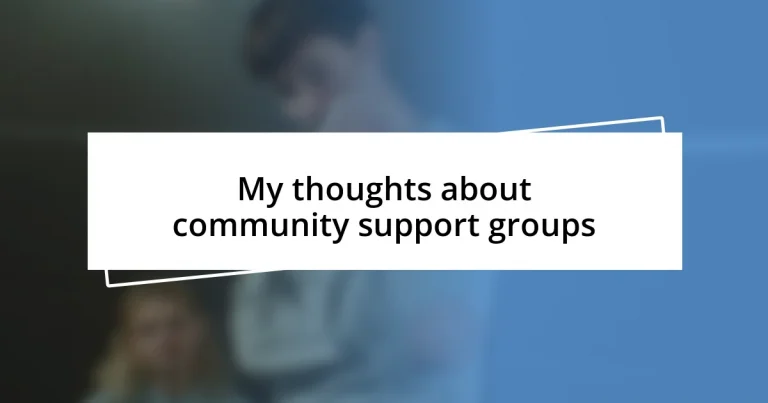Key takeaways:
- Community support groups foster emotional resilience and a sense of belonging through shared experiences and resource exchange.
- Effective communication, including active listening and encouraging participation, is vital for creating a safe and supportive environment in these groups.
- Overcoming challenges in support groups, such as vulnerability and navigating sensitive topics, can lead to deeper connections and personal growth.
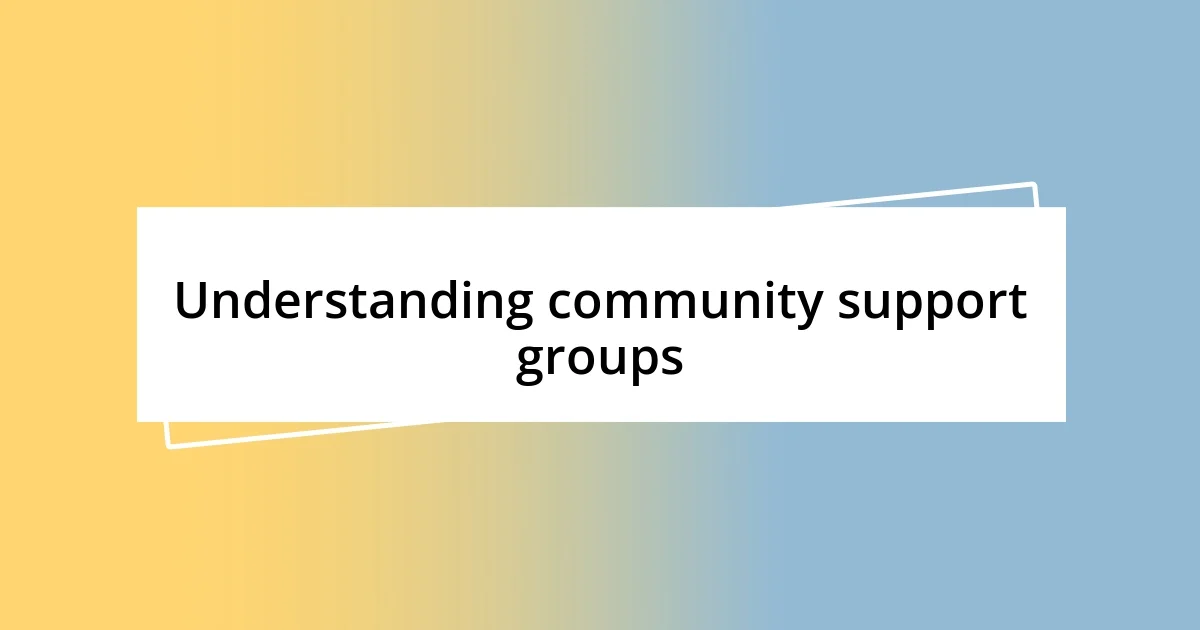
Understanding community support groups
Community support groups can be transformative spaces where individuals unite around shared experiences. I remember my first visit to a local group; the raw vulnerability I witnessed was both startling and comforting. It made me wonder, how often do we walk through life feeling isolated when there are so many others grappling with similar challenges?
These groups offer not only emotional support but also practical strategies for navigating life’s difficulties. For example, during one meeting, a member shared a simple breathing exercise that helped her manage anxiety daily. It was incredible to see how one person’s coping mechanism could resonate with so many—couldn’t we all use a few tools from each other’s experiences?
Participating in these groups fosters a sense of belonging that can sometimes feel elusive in our busy world. I often left feeling a weight lifted off my shoulders, knowing I was part of a community that truly understood. Isn’t it comforting to realize that you don’t have to face your battles alone?
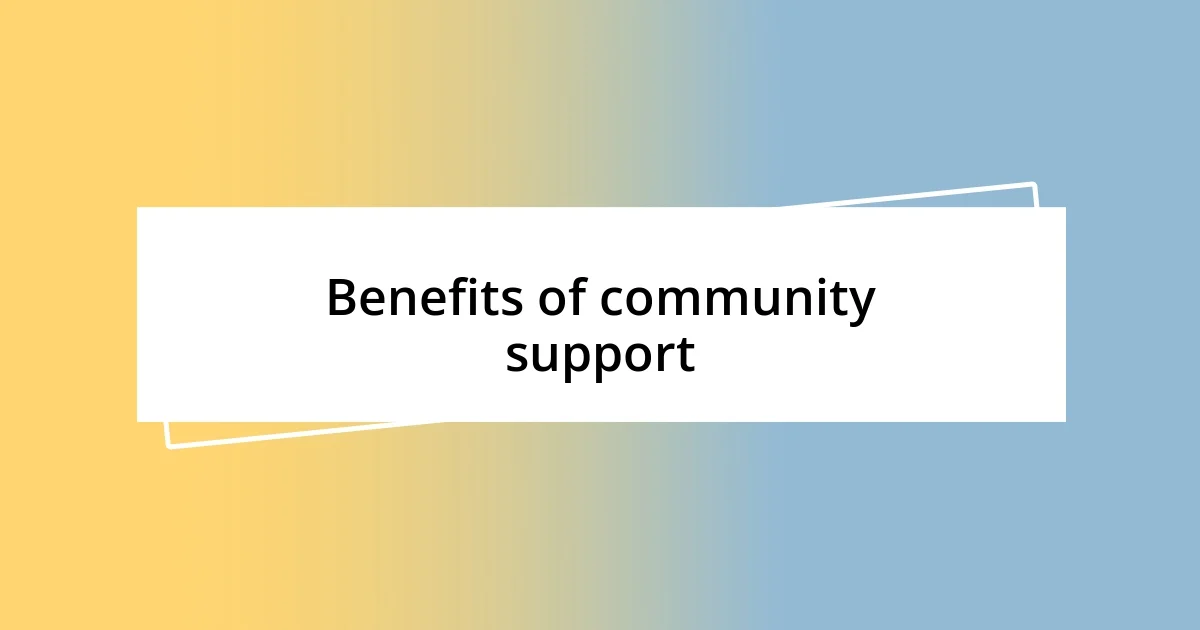
Benefits of community support
Community support groups provide an invaluable sense of belonging that can deeply impact personal well-being. I recall a session where members were encouraged to share their victories, no matter how small. The simple act of celebrating achievements together created an uplifting environment that made me feel connected and understood. By sharing our journeys, we form bonds that help us navigate life’s challenges together, which is something I didn’t fully grasp until I experienced it firsthand.
Here are some key benefits of community support:
- Enhanced Emotional Resilience: Connecting with others in similar situations helps build coping skills.
- Resource Sharing: Members often exchange tips and resources that can lead to better problem-solving.
- Sense of Empowerment: Hearing others’ stories inspires confidence and motivates individuals to take charge of their lives.
- Social Connection: Regular meetings foster friendships, decreasing feelings of isolation.
- Emotional Validation: Knowing others feel the same way can provide comfort and reassurance during tough times.
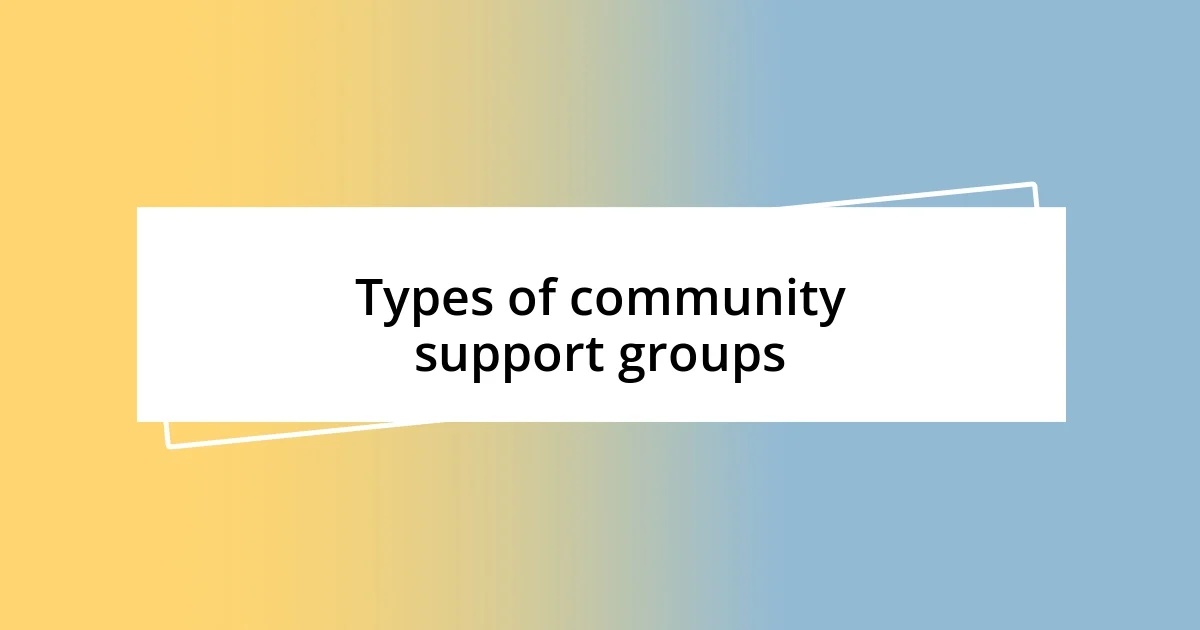
Types of community support groups
When it comes to community support groups, there’s a wide variety of types that cater to different needs and experiences. For instance, I’ve encountered groups focused on specific health issues, like chronic illness support or mental wellness. These targeted groups create a space where members share not only their struggles but also triumphs unique to their circumstances. The connections formed in these moments can be incredibly healing.
Another type I feel is essential are peer support groups, which often emphasize shared lived experiences rather than professional guidance. I’ve participated in a few of these, and the relatability was profound. Hearing someone candidly discuss their path through recovery or grief allowed me to feel seen and understood, almost as if my own feelings were being voiced. It’s in these exchanges that we often discover common ground.
Additionally, there are online support groups which have gained popularity, particularly for those who might not have access to local resources. I remember joining a virtual group during a particularly tough period last year. The flexibility of meeting online allowed me to connect with others from different parts of the world. Although screens separated us, I found solace in our shared stories. Isn’t it fascinating how technology can bridge gaps and forge connections?
| Type of Support Group | Description |
|---|---|
| Health-Focused Groups | Support tailored to specific health challenges, providing shared experiences and coping strategies. |
| Peer Support Groups | Emphasizes shared lived experiences instead of professional advice, fostering relatable connections. |
| Online Support Groups | Virtual platforms enabling wider reach and convenience for connecting with individuals globally. |
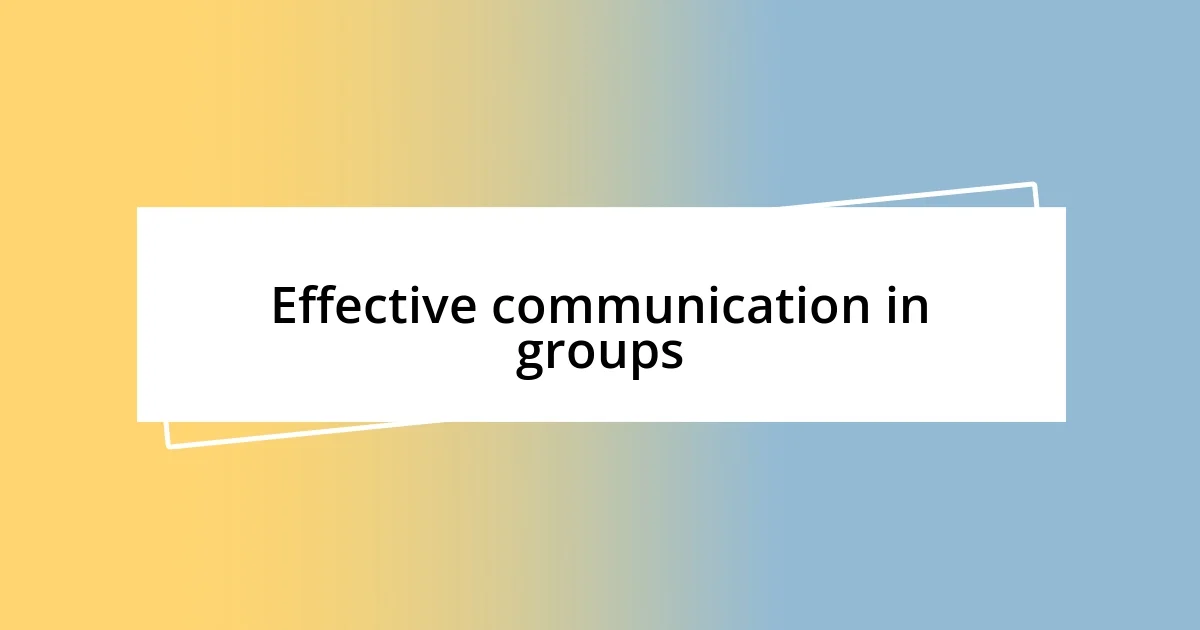
Effective communication in groups
Effective communication within community support groups is essential for fostering trust and understanding among members. I’ve learned that Active Listening plays a crucial role in this process. It’s not just about hearing words; it’s about truly absorbing what others share. I remember a meeting where a member spoke about feeling completely overwhelmed. The group’s attentive silence felt supportive and encouraged them to open up more. Isn’t it amazing how simply being present can create a safe space for sharing?
Encouraging participation is another vital aspect. I’ve noticed that when facilitators invite quieter members to share their thoughts, it can transform the dynamics of the group. There was a time when I hesitated to speak up, thinking my experiences were insignificant. But when someone gently prompted me to share, I felt a rush of relief and connection, as though my voice mattered. How many times do we just need that little nudge to realize the value of our perspectives?
Clear and respectful communication also sets the tone for conflict resolution. I once experienced a situation where differing opinions arose during a discussion. Instead of allowing tension to linger, the facilitator skillfully guided the conversation, prompting us to focus on understanding each other’s viewpoints. This taught me the significance of empathy in conversations, reminding me that we all come from different backgrounds and experiences. Have you ever experienced a breakthrough simply by being heard? It truly can make all the difference.
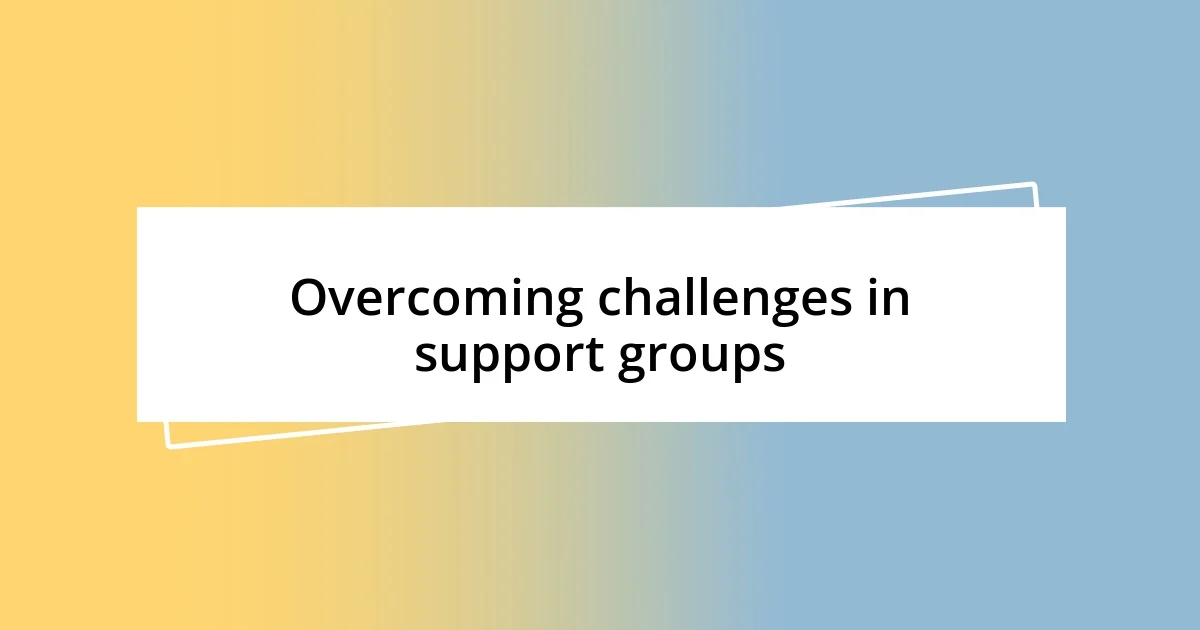
Overcoming challenges in support groups
Overcoming challenges in support groups often requires vulnerability and openness, which can be daunting at first. I remember feeling an overwhelming sense of apprehension when I joined my first group. The fear of judgment can be paralyzing, but slowly, as I shared my experiences, I realized that we were all there with similar struggles, and it became easier to connect. Isn’t it interesting how opening up can actually lessen our fears?
Another significant challenge is dealing with varying levels of commitment among members. I’ve been part of groups where some participants would regularly attend, while others would drop in and out sporadically. This inconsistency can disrupt the flow of discussion and make it difficult to build a strong community. However, I learned that it’s essential to foster an atmosphere where everyone feels welcome, regardless of their attendance frequency. Have you ever thought about how every contribution, no matter how small, adds value to the group?
Lastly, navigating sensitive topics can pose challenges that require careful handling. I recall a session where someone brought up a particularly distressing event in their life. The room fell silent, and I felt a collective hold of breath. It made me realize that while sharing difficult emotions can be frightening, it can also galvanize the group into deeper support. By establishing ground rules for respectful dialogue, we empower each other to share our truths without fear. Isn’t it remarkable how a few guidelines can transform a conversation into a healing experience?
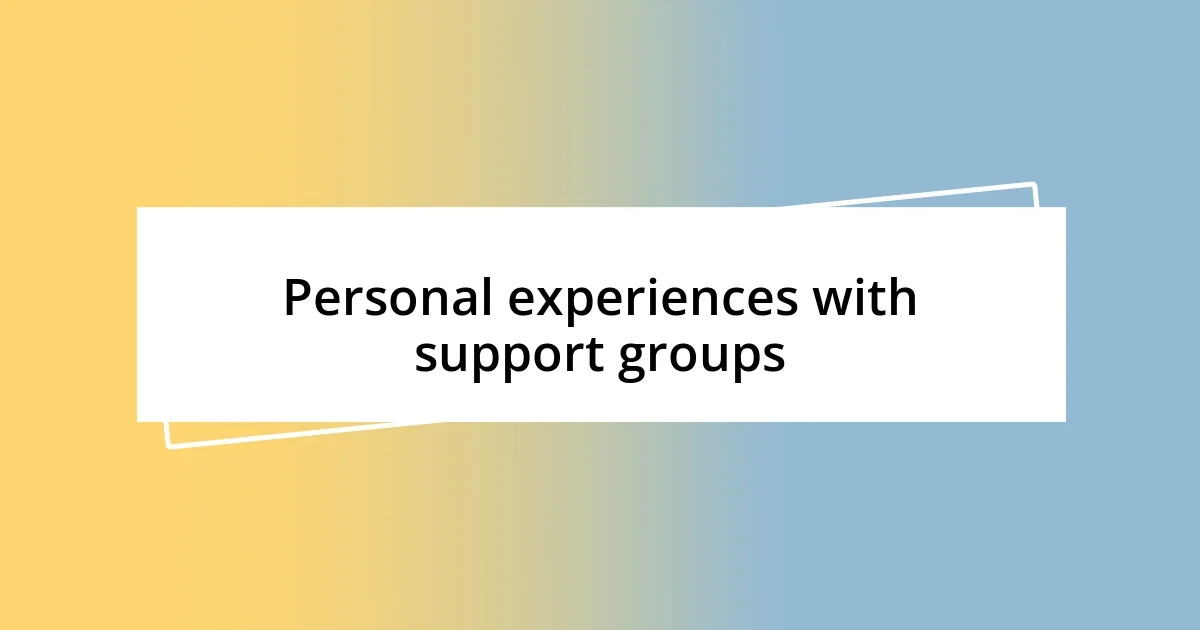
Personal experiences with support groups
I have to share that my journey with support groups has been full of unexpected revelations. I recall one instance when a member candidly discussed their struggle with anxiety. As they spoke, I could feel the weight of their words bouncing off the walls, resonating with my own experiences. It was as if a door had opened, allowing all of us to step into a space where our vulnerabilities connected. Have you ever felt that rush of empathy when someone shares a part of their story that reflects your own?
There was another moment during a group exercise where we paired up for one-on-one sharing. I was paired with someone I’d never spoken to before, and my initial awkwardness turned into profound conversation. As we exchanged our thoughts, our voices softened, revealing layers of our lives that we hadn’t anticipated sharing. It struck me how magical it can be to learn that we aren’t as isolated in our experiences as we sometimes think. Isn’t it empowering to realize that our stories can bridge gaps between us?
My first experience with feedback in a support group was enlightening. I had shared a personal struggle, and rather than just sympathy, I received thoughtful suggestions and encouragement from members. Initially, I worried about how my words would be received, fearing harsh judgment. Instead, I found a wellspring of kindness. This taught me that constructive feedback, when offered with care, can be just as supportive as a warm hug. Have you ever experienced a moment when someone’s perspective turned your own thinking upside down? Those moments can be truly transformative.












